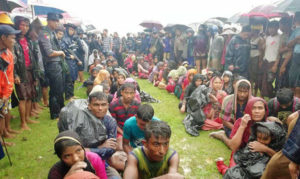by Farhad Chowdhury 1 August 2023
More than 1.1 million Rohingya refugees are living in Bangladesh, and the UNHCR’s most recent news item, “Rohingya refugees face hunger and loss of hope after latest ration cuts,” raises questions regarding their nutritional status and food security.
At the beginning of the year 2023, the World Food Program (WFP) shockingly lowered the amount of ration per person twice in the course of just three months.
The WFP cut the value of monthly food vouchers from USD 12 to USD 10 per person in March and further reduced it to USD 8 per person in June 2023, highlighting the financing shortfall.
Therefore, a Rohingya refugee’s daily budget for food and nutrition must not exceed 27 cents. Even the UN was had to reduce food rations for Rohingya refugees by 17%, which made the already dire situation worse.
The WFP, on the other hand, is adamant that it needs an immediate USD 125 million to avoid further rationing.
Are 27 cents enough for a Rohingya? is a million-dollar question. Morjina, a 27-year-old mother of three young children who is a single parent, said, “I had to cut the size of my children’s meals, but for how long? My family does not have access to enough food, and I am truly unsure of our future. (UNHCR, July 19 2023)
Ironically, funders have already turned their focus to the crisis in Europe (Ukraine). They had previously issued a warning that 20 to 30 percent of financing will be cut in 2022, including funds for the UN.
We are aware that geopolitics affects how much money is distributed for aid by bilateral and international donors.
However, it is amazing how they came up with the idea of reducing the ration when you take into account all political and nonpolitical issues. Without food, it is possible to survive without shelter, clothing, or education, but it is difficult to battle hunger.
One might infer from their strategy that they lack the foresight to recognize the disastrous effects of their choice.
Rohingyas may resort to sex slavery, underage marriage, or the perilous boat passage to neighboring countries to feed their hunger, which may result in crime and gender-based violence. There is evidence that Rohingyas are considering joining armed organizations because they can earn Tk 5,000 per month.
The decision will ultimately worsen the current situation of being trapped. The Bangladeshi people will also suffer as a result of their geopolitical choice, in addition to the Rohingya refugees.
Nearly a million Rohingyas are already living in Bangladesh. Only to house the Rohingya, the nation sacrificed its environment and natural beauty, and Bangladesh’s motives were solely humanitarian.
The Rohingya population will be forced to engage in criminal activity as a result of the lower ration, which will negatively impact Cox’s Bazar residents in the area.
Local media reports that several Bangladeshis were slain by Rohingyas in the Cox’s Bazar region, and that this trend is likely to continue.
The moment has come for the international community to reconsider its approach to the Rohingya refugee catastrophe. They were not to blame for their destiny, nor was the crisis brought on by the Bangladeshi administration or the state itself. They shouldn’t have to suffer as a result of something they did not do.
The UN and the international community, who support human rights, ought to take the initiative to find a solution. Either they (the international community) provide sufficient financial contributions to support a sizable number of refugees in Bangladesh, or they take decisive action against Myanmar to put an immediate end to the issue.
It’s time to eliminate their prejudice against the West. Both Ukrainians and Rohingyas are human beings. Thus, on a humanitarian level, these crises should receive equal attention. We cannot kill one in order to feed the other.
In actuality, the media, particularly the international media, has a tremendous impact on raising money for the Rohingya refugees. For instance, the Washington Post’s lead item from March 15, 2023, “Aid dwindles for Rohingya refugees as money goes to Ukraine, other crises,” is important in gaining support for the Rohingya cause internationally.
As a result, the international community’s resource allocation to the Rohingya refugees is decreasing, and local, regional, and international media outlets must broadcast more articles on this.

